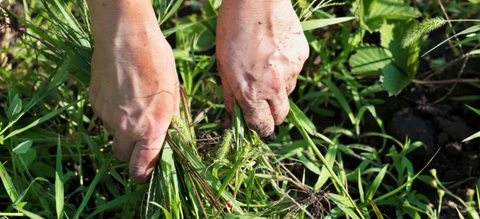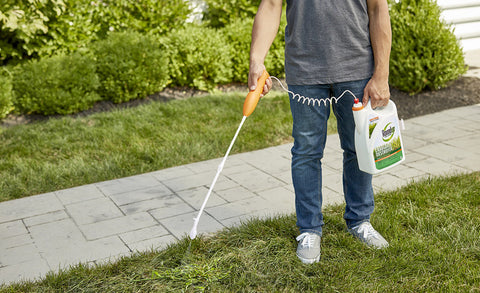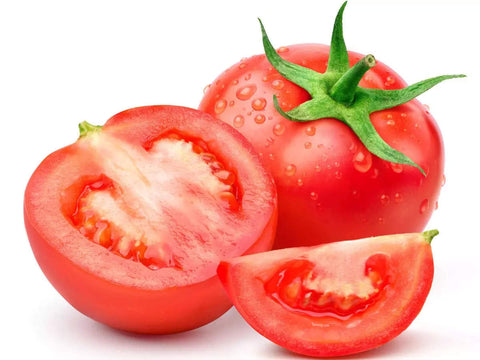Earth Day holds a special place in the hearts of environmentalists and nature lovers around the globe. It's a time to reflect on the importance of preserving our planet and taking action to protect its precious resources. One powerful way to celebrate Earth Day is through gardening, a practice deeply intertwined with sustainability and environmental stewardship. In this article, we'll explore the various ways gardening can contribute to a healthier planet and how you can join the movement to plant for the planet.

The Environmental Impact of Gardening
Carbon Sequestration
Gardens act as natural carbon sinks, absorbing carbon dioxide from the atmosphere and storing it in plants and soil. Through photosynthesis, plants convert carbon dioxide into oxygen, helping to mitigate climate change by reducing greenhouse gas levels.
Biodiversity Promotion
Gardens provide habitats for a diverse range of plant and animal species, fostering biodiversity and ecological resilience. By planting native species and creating wildlife-friendly environments, gardeners play a crucial role in preserving biodiversity and supporting pollinators and other wildlife.
Soil Health Improvement
Gardening practices such as composting and mulching enhance soil health by adding organic matter and nutrients. Healthy soil promotes plant growth, reduces erosion, and improves water retention, contributing to overall ecosystem health.
Selecting Plants for Sustainability
Native Plants vs. Non-Native Plants
Choosing native plant species helps preserve local ecosystems and supports native wildlife populations. Native plants are adapted to the region's climate and soil conditions, requiring less water and maintenance compared to non-native species.
Drought-Tolerant Species
In regions prone to water scarcity, selecting drought-tolerant plants conserves water resources and reduces the need for irrigation. These resilient plants can thrive in arid conditions, making them ideal choices for sustainable landscaping.
Pest-Resistant Varieties
Opting for plant varieties with natural pest resistance reduces the need for chemical pesticides, promoting a healthier environment for humans and wildlife alike. Integrated pest management techniques further minimize the impact of pests on garden ecosystems.
Creating a Sustainable Garden Design
Utilizing Permaculture Principles
Permaculture design principles emphasize working with nature to create self-sustaining ecosystems that mimic natural patterns and processes. By incorporating principles such as polyculture and companion planting, gardeners can maximize efficiency and resilience in their gardens.
Incorporating Rainwater Harvesting
Collecting rainwater from rooftops and other surfaces reduces reliance on municipal water supplies and prevents runoff pollution. Rain barrels, cisterns, and swales can capture and store rainwater for irrigation, minimizing water waste in the garden.
Implementing Companion Planting Techniques
Companion planting involves strategically grouping plants together to enhance growth, repel pests, and improve soil fertility. By planting compatible species in close proximity, gardeners can create synergistic relationships that benefit the entire garden ecosystem.

Sustainable Gardening Practices
Organic Gardening Methods
Organic gardening avoids synthetic pesticides and fertilizers, prioritizing natural alternatives such as compost, organic mulch, and beneficial insects. By nurturing soil health and promoting biological diversity, organic gardens support a thriving ecosystem without harming the environment.
Mulching and Composting
Mulching with organic materials like leaves, straw, or wood chips conserves soil moisture, suppresses weeds, and adds nutrients to the soil as it breaks down. Composting kitchen scraps and garden waste further enriches the soil, closing the nutrient cycle and reducing waste sent to landfills.
Avoiding Chemical Pesticides and Fertilizers
Chemical pesticides and fertilizers can harm beneficial insects, pollute waterways, and degrade soil health over time. By adopting natural pest control methods and using organic fertilizers, gardeners can maintain a healthy balance in the garden ecosystem.
Community Gardening Initiatives
Benefits of Community Gardens
Community gardens serve as green spaces for social interaction, physical activity, and fresh food production, enhancing community well-being and cohesion. These shared spaces foster a sense of ownership and stewardship among participants, strengthening local neighborhoods.
Collaborative Efforts for Environmental Stewardship
By pooling resources and expertise, community gardeners can implement sustainable practices on a larger scale and address common environmental challenges such as soil erosion, food waste, and habitat loss. Collective action amplifies the impact of individual efforts, creating positive change in the community.
Engaging with Local Organizations and Initiatives
Partnering with environmental organizations, schools, and local government agencies amplifies the reach and impact of community gardening initiatives. Collaborative projects, educational workshops, and public outreach events raise awareness about environmental issues and inspire community members to take action.
Gardening for Wildlife Conservation
Creating Habitats for Pollinators
Planting native flowering plants and providing nesting sites, water sources, and sheltered areas create welcoming habitats for bees, butterflies, and other pollinators. Supporting pollinator populations enhances ecosystem resilience and promotes food security through enhanced crop pollination.
Providing Food Sources for Birds and Insects
Growing a diverse range of plants that produce berries, seeds, and nectar provides essential food sources for birds, insects, and other wildlife throughout the year. By cultivating wildlife-friendly gardens, gardeners contribute to local biodiversity conservation efforts and create wildlife corridors in urban areas.
Supporting Local Ecosystems Through Gardening
Gardens serve as interconnected ecosystems that contribute to broader ecological networks in urban and suburban landscapes. By preserving native plant species and creating wildlife-friendly habitats, gardeners help maintain healthy ecosystems and support local wildlife populations.

Educational Opportunities Through Gardening
Teaching Sustainable Practices to Children
Incorporating gardening into school curricula and extracurricular activities introduces children to concepts like plant life cycles, soil health, and ecosystem dynamics. Hands-on gardening experiences foster a deeper connection to nature and instill lifelong stewardship values in future generations.
Hosting Workshops and Classes on Gardening
Community organizations, botanical gardens, and extension services offer workshops and classes on topics such as organic gardening, permaculture design, and native plant landscaping. These educational opportunities provide valuable knowledge and skills for gardeners of all experience levels.
Promoting Environmental Awareness Through Hands-On Activities
Gardening workshops, nature walks, and volunteer opportunities engage participants in meaningful activities that highlight the interconnectedness of humans and the environment. By fostering a sense of responsibility and empowerment, these activities inspire individuals to take positive environmental action in their communities.
Incorporating Sustainable Materials and Tools
Using Recycled and Upcycled Materials
Repurposing materials such as reclaimed wood, recycled plastic containers, and salvaged bricks reduces waste and minimizes the carbon footprint of gardening projects. Creative reuse of materials adds character and uniqueness to garden designs while promoting resource efficiency.
Opting for Eco-Friendly Gardening Tools
Selecting hand tools made from sustainable materials such as bamboo, stainless steel, or FSC-certified wood reduces reliance on fossil fuels and minimizes environmental pollution. Electric or manual tools with energy-efficient features further reduce environmental impact during garden maintenance.
Minimizing Plastic Usage in the Garden
Avoiding single-use plastic products like plant pots, irrigation tubing, and synthetic mulch helps reduce plastic pollution and protect aquatic ecosystems. Choosing biodegradable or reusable alternatives like peat pots, drip irrigation systems, and organic mulches promotes a more sustainable gardening practice.
Gardening as a Therapeutic Activity
Benefits of Gardening for Mental Health
Engaging in gardening activities reduces stress, anxiety, and depression by providing a sense of accomplishment, purpose, and connection to nature. The rhythmic tasks of planting, weeding, and harvesting promote relaxation and mindfulness, improving overall well-being.
Stress-Relieving Aspects of Connecting with Nature
Spending time in green spaces and immersing oneself in the sights, sounds, and scents of the garden environment promotes relaxation and stress reduction. Nature's calming effects on the mind and body enhance mood and cognitive function, fostering emotional resilience and self-care.
Cultivating Mindfulness Through Gardening Practices
Gardening encourages mindful awareness of the present moment as gardeners observe plant growth, soil textures, and seasonal changes. By practicing mindful gardening techniques such as deep breathing, gentle movement, and focused attention, individuals cultivate inner peace and presence in their daily lives.

Addressing Climate Change Through Gardening
Mitigating the Urban Heat Island Effect
Green spaces such as gardens, parks, and urban forests mitigate the urban heat island effect by providing shade, evaporative cooling, and air purification. By reducing surface temperatures and improving air quality, gardens help create more livable and sustainable cities.
Alleviating Air Pollution Through Green Spaces
Plants absorb air pollutants like carbon dioxide, ozone, and particulate matter, improving air quality and human health in urban areas. Increasing greenery through gardening projects reduces the concentration of harmful pollutants and enhances the overall environmental quality of urban landscapes.
Contributing to Local Climate Resilience Efforts
Gardens act as microclimates that moderate temperature extremes, buffer stormwater runoff, and support biodiversity in urban ecosystems. By enhancing soil health, conserving water resources, and providing habitat for wildlife, gardens strengthen the resilience of communities to climate-related challenges.
Celebrating Earth Day with Gardening Events
Participating in Community Clean-Up Events
Volunteering for community clean-up events and habitat restoration projects helps beautify public spaces and improve local environmental quality. By removing litter, invasive species, and other pollutants, participants contribute to a cleaner, healthier planet for future generations.
Hosting Tree Planting Ceremonies
Organizing tree planting ceremonies in parks, schools, and neighborhoods enhances green infrastructure and promotes carbon sequestration. Planting trees not only beautifies the landscape but also provides shade, habitat, and oxygen for humans and wildlife alike.
Organizing Seedling Swaps and Plant Sales
Seedling swaps and plant sales offer opportunities for gardeners to exchange plants, share gardening tips, and support local environmental initiatives. These community events promote biodiversity, conservation, and sustainable gardening practices while fostering a sense of camaraderie among participants.
Conclusion
As we celebrate Earth Day, let us recognize the power of gardening as a meaningful way to connect with and care for our planet. By embracing sustainable gardening practices, fostering community engagement, and sharing our gardening successes, we can make a positive impact on the environment and create a greener, healthier world for future generations. Together, let us plant for the planet and celebrate the beauty and abundance of nature that surrounds us.













